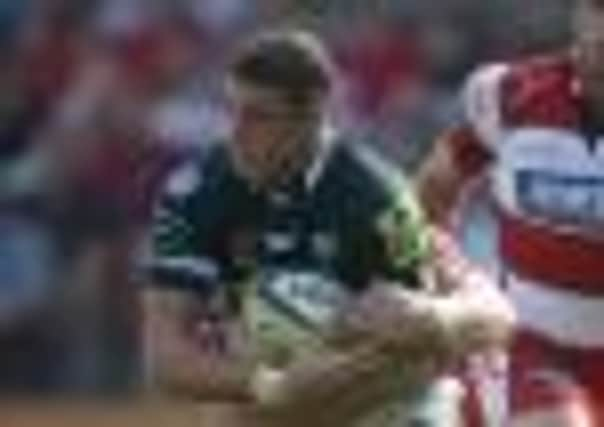Allan Massie: Steven Shingler selection row sure to rumble on


There is no doubt that he is qualified to play for Scotland. His mother hails from Dumfries and he has a host of relatives living in Langholm.
The trouble is that he is also qualified to play for Wales (indeed for England too) and played last season for the Wales under-20 side. IRB regulations allow a player who has represented one country at age-group level to transfer to another for which he is qualified at senior level. The trouble is that the WRU, having dispensed with an “A” international team, has chosen to nominate its under-20 side as its second XV.
Advertisement
Hide AdAdvertisement
Hide AdNevertheless, it is surely arguable that it remains an age-group team and that the IRB ruling which permits transfer of allegiance from age-group teams applies in Shingler’s case. Moreover, the player says that he refused to sign a letter which would have committed him to Wales at senior level.
Most of us will know very little about the young man. His club website describes him as Welsh, because he was born in Swansea and has previously played for Llanelli and the Scarlets. As I have often remarked, nationality, and consequent eligibility to represent a country, must often be a matter of choice – seven or eight of our World Cup party had qualifications which would have permitted them to play for another country, while the current Welsh captain, Sam Warburton, might have opted for England.
Just this week, England won a tug-of-war with Wales by persuading the Scarlets No 8 Ben Morgan to commit himself to the country of his birth rather than Wales.
In Shingler’s case, it seems to me that the WRU’s decision to nominate their under-20 team as their second XV is a rather sly attempt to bend IRB regulations, and is against both the letter and the spirit of the law relating to eligibility.
Meanwhile, Robinson has done a nice balancing act in his selection of the Six Nations squad. He has sensibly retained the 28 members of the World Cup squad who are still available to him, and added eight others including six who are still uncapped. A couple of the 28 – Dan Parks and Simon Danielli – are probably approaching the end of their international careers, though it would be no surprise to see both appearing in this year’s tournament. However there is no recall for Hugo Southwell, now with Wasps, or for Johnnie Beattie, whose inability to regain his form of two years ago is as mystifying at it is disappointing. It is also sad that Alex Grove, who looked more than promising when capped in the autumn of 2010, seems to have dropped out of the reckoning.
There are some others who must have been close to selection: Pat MacArthur, who has been mostly first-choice hooker for Glasgow ahead of Dougie Hall and who, from what I have seen of him, is unlucky to have been left out, as is Stuart McInally, especially impressive in the speed with which he carries ball from the set scrum. The call for both will surely not be long delayed. Glasgow No 8 Ryan Wilson must also have been very much in consideration.
Shingler aside, none of the other players from outside the World Cup party is a surprising or unexpected selection. Greig Laidlaw, Stuart Hogg, Lee Jones, Duncan Weir, David Denton and Rob Harley have all been starring for either Edinburgh or Glasgow, while Fraser McKenzie has been playing regularly for Sale Sharks. Any of them could force his way into the starting XV or at least the match-day squad, though it’s unlikely that Robinson will include more than a couple of them at any one time. Chris Paterson’s retirement and the omission of Southwell means that there is a vacancy at full-back. Rory Lamont, if fit , might be the safe choice. Danielli has frequently played at 15 for Ulster this season. Going for young Hogg would be bold. I doubt if an Australian selector would hesitate to pick him.
There are three scrum-halves and three fly-halves in the squad, and also Laidlaw, good enough to play international rugby in either position. So at least three of the seven will not make the match-day squad. I suspect that performances in the next two rounds of the Heineken Cup may determine who’s in and who’s out. With Sunday matches against Wales and France, there must be a question mark over Euan Murray. Nevertheless it is so important to make a good start to the tournament, especially if your first game is at home, that he is surely likely to play against England, assuming he is fully fit and in form. Whoever replaces him – Geoff Cross or Moray Low – for the next two games would have the chance of keeping Murray out for the last two.
Advertisement
Hide AdAdvertisement
Hide AdThere is perhaps a problem at No 7. John Barclay hasn’t been in his best form and Sean Lineen has sometimes preferred to field Chris Fusaro. Likewise, at Edinburgh, Michael Bradley has tended to pick Roddy Grant rather than Ross Rennie. Yet neither Fusaro or Grant is in the squad, while Barclay and Rennie remain in favour.
No captain has yet been named. Since the captain should be certain of his place in the team, and likely to play for the whole 80 minutes of a match, Kelly Brown seems the best choice.